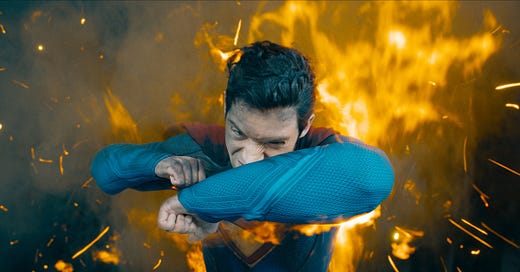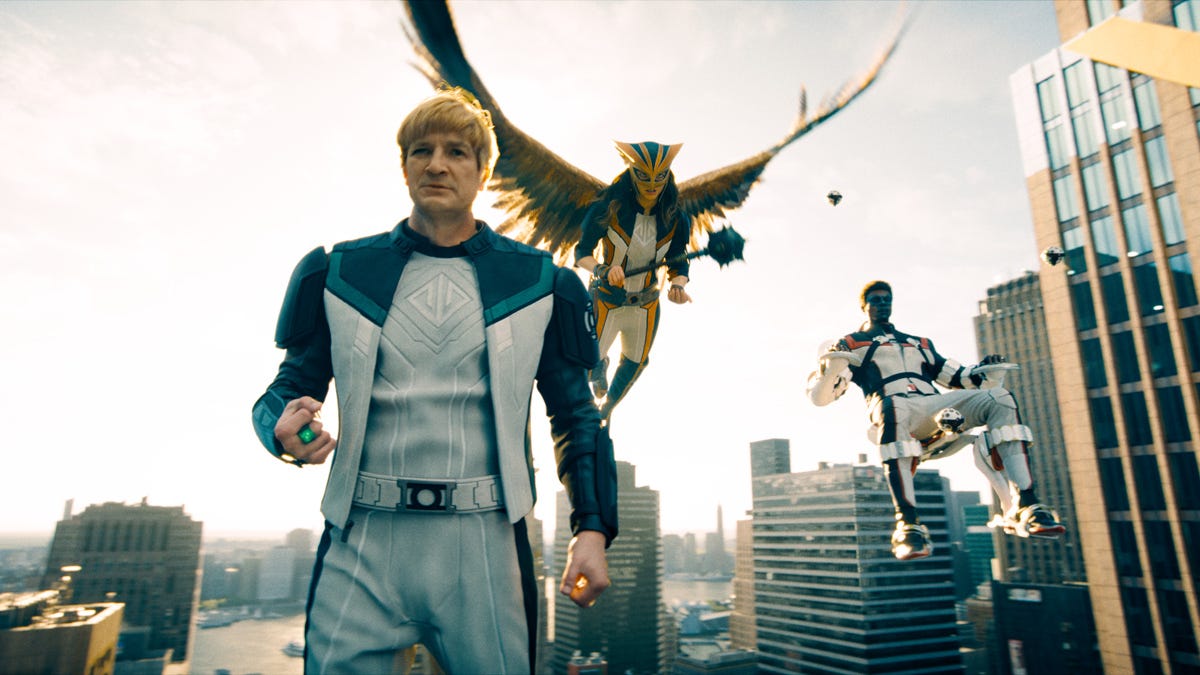'Superman' Valiantly Tries to Pull Superheroes Down from the Rafters
James Gunn's Superman reboot works well when it's super silly but gets kind of incoherent when it tries to be serious.
Welcome to The #Content Report, a newsletter by Vince Mancini. I’ve been writing about movies, culture, and food since the late aughts. Now I’m delivering it straight to you, with none of the autoplay videos, takeover ads, or chumboxes of the ad-ruined internet. Support my work and help me bring back the cool internet by subscribing, sharing, commenting, and keeping it real.
—
It’s hard not to appreciate what James Gunn is trying to do with Superman. Above all, what this latest Superman reboot presupposes is, maybe comic book movies aren’t that serious? In contrast to Marvel’s touchy-feely faux existentialism (with jokes!), James Gunn’s Superman feels a lot like a massive-budget film from Troma, the B-movie grindhouse where he got his start.
Which is to say: characterized less by some grand overarching vision than by whatever Gunn thought was funny in the moment. His sense of humor seems to lean more Rocky Horror than soy banter, a subtle-but-important distinction, with lots of the kitsch and smart aleckiness of Joss Whedon’s Tumblrisms, but more character-based and less cringe.
In one scene, Superman is furious because Lex Luthor kidnapped his super-dog, Krypto. Later in the film, the plot turns on Lex’s bimbo henchwoman constantly taking selfies. We eventually get the expected portals and subatomic mumbo jumbo with machines tearing at the fabric of reality, but Superman’s stakes never feel all that high. And that’s… nice. Where Marvel movies always feel corporate, or occasionally like a corporation using someone with artistic cred as a sock puppet (see: using recently-minted Nomadland Oscar winner Chloe Zhao to film superheroes having slow missionary sex on a beach in Eternals), James Gunn has an uncanny ability to shoot massive budget comic book movies that still sort of feel like his personal ‘zine.
So… success?
Eh, sort of. Gunn’s personal touch and general likability (not to mention his prodigious gifts as a visual stylist, which are the best part of what he does) make Superman easy to watch. But at the same time, its success from scene to scene never quite congeals into a whole. It is, like most movies these days, mostly an entertaining pastiche of things you’ve already seen, better at reminding you of things you already enjoyed than at creating new ones. Which does raise the question of what more is even possible with this genre? It’s quite possible that this is the ceiling for an expanded-universe tie-in superhero movie in 2025. Hot people, solid acting, nice action — B+. Even so, I saw it last night and for the first few hours this morning forgot that I was supposed to be reviewing it. Most of the experience had already turned to vapor.
David Corenswet plays Clark Kent/Superman now, and he sort of looks like the radio edit Henry Cavill, albeit with otherwordly dimples. He and Lois Lane (Rachel Brosnahan) are already an item, she already knows he’s Superman, and you can easily imagine them making beautiful inky brunette blue-eyed babies together, provided the babies employ the same colorist (who did excellent work).
In the film’s opening crawl, we learn that “meta humans” have existed on Earth for three centuries, and that Superman has been the most powerful of them for the past three decades. Three days ago, we further learn, he managed to keep the country of Boravia from invading its weaker neighbor, Jarhanpur. When Clark flirtatiously allows his girlfriend Lois Lane to interview Superman about this, she asks him pointed questions, and he gets flustered — an exchange that became the centerpiece of the trailer. Lois presses Superman on “unilaterally” attempting to end this invasion without consulting anyone in the US government (the dastard!). Superman counters that he didn’t kill anyone. She grills him about “kidnapping” the leader of Boravia (Russ-Israel, let’s call them), whom he admits flying to a desert and “pressing him against a cactus” until he agreed to withdraw his armies.
“So you tortured him,” she says.
“People were going to die!” he shouts.
The rub here seems to be that Superman is deeply humanistic and has his heart in the right place, but he’s also a little immature, and naive in thinking through all the consequences of his actions. That this Superman spends a lot of time considering the human costs of fighting bad guys makes him a nice contrast to the Man of Steel Superman (and frankly most of the superheroes in movies released since it became possible to destroy entire cities with CGI), who seemed to always just take civilian casualties as a given (though I otherwise enjoyed Man of Steel’s unabashed bombast). Gunn is creating a character here who is at once smart-alecky and impetuous, but also sort of the ultimate boy scout. That both his power and his weakness are that he cares too much about people sounds maybe obvious, and true to the character’s origin, but feels exactly like the kind of back-to-basics correction superhero movies probably need.
That was also essentially the mission statement of punk rock in the late seventies, to strip away a genre’s bloat and rediscover its roots. Gunn seems like he’s trying to draw an overt parallel here, but doesn’t quite stick the landing. When Lois and Clark have a fight, about how she thinks maybe she and Clark are too different, she describes being a professional cynic who was sneering and going to punk shows since she was a teenager, whereas Clark “just loves everybody.”
“Maybe that’s what makes me punk rock,” Clark grumbles.
It’s kinda cute and slightly schmaltzy, which maybe Superman should be, but people have also been trying to make “sincerity is the new punk” happen since the 90s, and every time I hear a new iteration of it the bile starts to rise in my throat. Nothing makes me want to smear myself with shit and roll around in broken beer bottles like someone selling earnestness as a brand strategy.
Meanwhile, there’s a lot of other stuff going on in Superman, much of it good in a vacuum but coexisting uneasily with the other plotlines. For instance, there’s the conflict between Russ-Israel and its neighbor, Jarhanpur, into which Lex Luthor (Nicholas Hoult) — seemingly one of contemporary cinema’s many Elon Musk stand-ins — has corruptly inserted himself. Luthor has created a rival Superman, “The Hammer of Boravia,” (great name) and made a secret pact with Boravia’s wild-haired, dissolute Slav leader, Vasil Ghurkos, played by the wonderfully memorable Croatian actor Zlatko Buric (even when Gunn can’t make his provocations come together, he excels at absurdist humor, especially the visual kind). This Luthor is driven by envy of Superman (and not subtly so, he literally shouts as much during one scene), and eventually imprisons the man of steel in a “pocket universe.” Cue the subatomic mumbo-jumbo.





